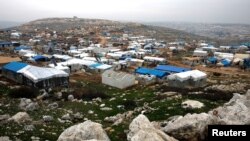The U.N. Security Council began potentially contentious negotiations Tuesday on whether to continue humanitarian aid operations from Turkey into northern Syria for another year.
“It’s a lot at stake,” Norway’s U.N. Ambassador Mona Juul told reporters on her way into the closed-door discussions. “It is really a life-or-death issue for so many – we are talking about millions in Syria.”
If the council fails to reach a compromise in order to avoid potential vetoes from Russia and China, then the cross-border aid operation which reaches some 3.4 million people who live outside government control in northwest Syria will end on July 10.
That means sending food, clean water, medicines and COVID-19 vaccines would become much more difficult, if not nearly impossible, due to obstruction from the regime in Damascus.
“In the midst of a pandemic, how can we possibly justify closing a reliable delivery route for vaccines?” U.S. Ambassador Linda Thomas-Greenfield told reporters. “How can we justify cutting off innocent children – or anyone for that matter – from food, from clean water and from medicine? The answer to this is simple: We can’t. We must renew this mandate.”
China’s U.N. envoy, Zhang Jun made clear that Beijing sees this negotiation as about more than continuing the cross-border aid operation.
“I sincerely hope with more diplomatic efforts we can find a solution, but for China definitely we want to see solutions concerning unilateral sanctions, concerning cross-line, concerning the transparency of cross-border,” Ambassador Zhang told reporters after the meeting. “We are not simply tackling the extension of the cross-border, we are talking about the general humanitarian situation in Syria, and we need to tackle all the fundamental issues.”
Russia, China and Syria’s regime argue that all humanitarian assistance to the country’s north should move across conflict front lines, under the control of the Assad government. But the United Nations and aid agencies on the ground say the cross-line operation is inadequate to meet the tremendous demands.
“This is a not a discussion about sanctions, it’s a question of the humanitarian needs,” Ambassador Thomas-Greenfield said when told of the Chinese envoys remarks.
She said the United States has put forward “a serious and credible proposal” to expand cross-line assistance in Syria but emphasized that it “is not a substitute for cross-border.”
When the council initially authorized the aid operations in 2014, four crossing points were activated – two from Turkey, one from Iraq and one from Jordan. In the last two years, Russia and China have forced the closure of all but one – Bab al-Hawa, which connects southern Turkey with northwest Syria.
The draft resolution under discussion calls for a one-year renewal of Bab al-Hawa and the reauthorization of Yarubiyah, which connects Syria with Iraq and was used to bring in medical supplies. Vetoes from Russia and China forced Yarubiyah’s closure in January 2020, just as the COVID-19 pandemic began to spread across the world.
Negotiations will continue this week, and a council vote on the operation’s fate is expected Thursday.
Fate of Millions of Syrians Hangs in Balance of Tough UN Talks




